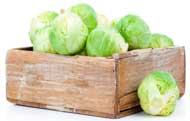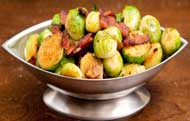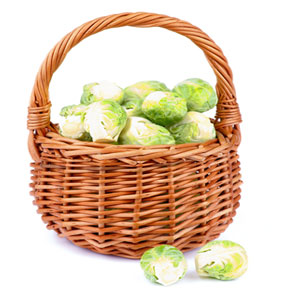





1. Brussels Sprout Facts
2. Types of Brussels Sprouts
3. Nutritional Value
4. Health Benefits
Brussels sprouts, or Brassica oleracea gemmifera, are related to other better-known vegetables in the brassica genus like broccoli, cabbage and cauliflower. They are part of the cruciferae or mustard family, so known because of a four-part flower in the shape of a cross. Brussels sprouts are a small round vegetable consisting of many green leaves wrapped tightly around each other, like a cabbage but smaller.
History and Origin
Sprouts were believed to have been cultivated in Italy in Roman times, and possibly as early as the 1200s in Belgium. The modern Brussels sprout that we are familiar with was first cultivated in large quantities in Belgium (hence the name "Brussels" sprouts) as early as 1587
Vegetables " Brussels Sprouts " ( Nutritional value )
Nutritional value per 100 g
Brussels sprouts, cooked, boiled, drained, without salt
|
Nutrient ( Proximate's )
|
Unit
|
Value
|
Daily Value %
|
|
Energy
|
kcal
|
36
|
1.7%
|
|
Protein
|
g
|
2.55
|
5.1%
|
|
Total lipid (fat)
|
g
|
0.50
|
0.006%
|
|
Carbohydrate, by difference
|
g
|
7.10
|
2.5%
|
|
Fiber, total dietary
|
g
|
2.6
|
9.2%
|
|
Sugars, total
|
g
|
1.74
|
|
|
Minerals
|
|||
|
Calcium, Ca
|
mg
|
36
|
2.7%
|
|
Iron, Fe
|
mg
|
1.20
|
5.5%
|
|
Magnesium, Mg
|
mg
|
20
|
4.7%
|
|
Phosphorus, P
|
mg
|
56
|
4.4%
|
|
Potassium, K
|
mg
|
317
|
6.7%
|
|
Sodium, Na
|
mg
|
21
|
0.009%
|
|
Zinc, Zn
|
mg
|
0.33
|
3%
|
|
Copper, Cu
|
mg
|
0.083
|
9.2%
|
|
Manganese, Mn
|
mg
|
0.227
|
19.8%
|
|
Selenium, Se
|
mcg
|
1.5
|
2.7%
|
|
Vitamins
|
|||
|
Vitamin C, total ascorbic acid
|
mg
|
62.0
|
68.8%
|
|
Thiamin (B-1)
|
mg
|
0.107
|
8.9%
|
|
Riboflavin (B-2)
|
mg
|
0.080
|
6.1%
|
|
Niacin NE (niacin) (B-3)
|
mg
|
0.607
|
3.7%
|
|
Pantothenic acid (B-5)
|
mg
|
0.252
|
5%
|
|
Vitamin B-6
|
mg
|
0.178
|
10.4%
|
|
Folate DFE (dietary folate) (B-9)
|
mcg
|
60
|
15%
|
|
Vitamin B-12
|
mcg
|
0.00
|
|
|
Vitamin A, RAE (retinol)
|
mcg
|
39
|
4.3%
|
|
Vitamin E (alpha-tocopherol)
|
mg
|
0.43
|
2.8%
|
|
Vitamin D (D2 + D3)
|
mcg
|
0
|
|
|
Vitamin K (phylloquinone)
|
mcg |
140
|
116.6%
|
|
Lipids
|
|||
|
Saturated Fatty Acids
|
g
|
0.102
|
|
|
Monounsaturated Fatty Acids
|
g
|
0.038
|
|
|
Polyunsaturated Fatty Acids
|
g
|
0.255
|
|
|
Trans Fatty Acids
|
g
|
0.000
|
|
|
Carotenoids
|
|||
|
Beta-Carotene
|
mcg
|
465
|
|
|
Lutein + zeaxanthin
|
mcg |
1290
|
|
|
Lycopene
|
mcg
|
0
|
|

|
Reference Values are based on a 2,000 Calorie Intake, for Adults and Children 4 or More Years of Age. Your daily values may be higher or lower depending on your calorie needs.
|
|
Percentages are roughly approximated using (RDA) Recommended Dietary Allowances for adults. Source: USDA United States Department of Agriculture
|
|
Reference Values for Nutrition - FDA U.S. Food and Drug Administration
|
Brussels sprouts Nutritional Value
An 80g serving contains four more times vitamin C than an orange and a cup of cooked sprouts is only about 60 calories.
Brussels sprouts have many health benefits. Add brussels sprouts to your diet to prevent cell damage, prevent many common cancers, support eye health, keep skin healthy, support the digestive system, detox support and cardiovascular support. Brussels sprouts are high in antioxidants and regarded as being anti-inflammatory.
Steaming, oven roasting or stir frying brussels sprouts, as opposed to boiling them, will retain their health benefits significantly. Overcooking sprouts will smell like rotten eggs due to the high levels of sulforaphane they contain.
This vegetable is supposedly an aid for fertility due to it's high folic acid content. An 80g serving contains four more times vitamin C than an orange and a cup of cooked sprouts is only about 60 calories.
With the high levels of vitamins A and C, folic acid and dietary fibre, research indicates brussels sprouts can help protect against colon and stomach cancer. Studies have suggested that increasing your consumption of sprouts decreases the risk of obesity, diabetes, heart disease and promotes a healthy complexion, increased energy, and overall lower weight.
- SUPPORTS EYE HEALTH
Vitamin C - DIABETES
Antioxidant known as alpha-lipoic acid - MACULAR DEGENERATION
Antioxidant - zeaxanthin, filters out harmful blue light rays - DETOX SUPPORT
Rich in sulfur-containing nutrients

- BONE HEALTH
High content of vitamin K - PROTECTION AGAINST SOME CANCERS
Sulfur-containing sulforaphane - HEART DISEASE
Anti-inflammatory benefits - OBESITY
Low in calories and a potent anti-inflammatory
References
|
Nutrient Database - USDA (United States Department of Agriculture)
|
|
Reference Values for Nutrition - FDA U.S. Food and Drug Administration
|
